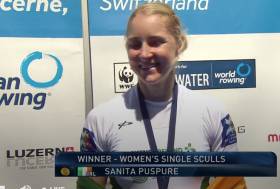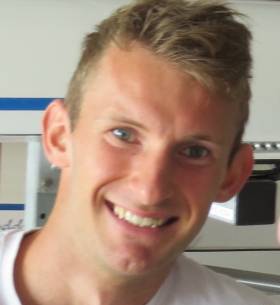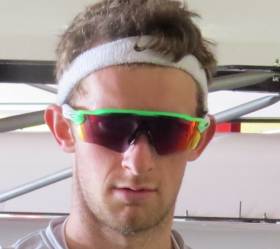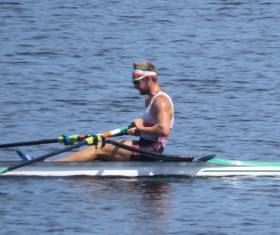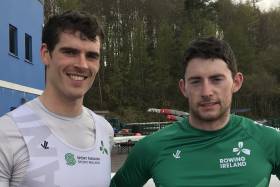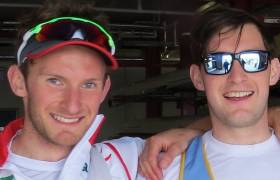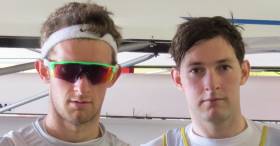Displaying items by tag: Lucerne
Two more Irish rowing crews have joined the four already qualified for the Tokyo Olympics this summer after this morning’s (Sunday 16 May) races in Lucerne, as The Irish Times reports.
The women’s four of Emily Hegarty, Eimear Lambe, Aifric Keogh and Fiona Murtagh led the charge in their A Final ahead of China, where as previously reported on Afloat.ie only the top two were guaranteed Olympic places.
Meanwhile, the lightweight women’s double pairing of Aoife Casey and Margaret Cremen finished third behind the US and home team Switzerland to confirm their spot in Tokyo.
Elsewhere, Daire Lynch missed out on the men’s single scull final after he finished fourth in his A/B semi.
We want to thank our Partners for their continued support of Irish Rowing and the High-Performance Team!
— Rowing Ireland (@RowingIreland) May 16, 2021
☘☘☘
Our Partners
?@KineticaSports
?@powerhousesport
?@IrlSanity
?@AYIreland
A lot of hard work and support goes in behind the scenes from our partners! pic.twitter.com/zsSTglNueP
The Irish Times has more on the story HERE.
Rowing Ireland adds:
The Irish Rowing Team qualified an additional two boats for the Olympics. There will now be six boats representing Ireland in Tokyo this summer.
The Irish crews led by High-Performance Director Antonio Maurogiovanni and Coaches Dominic Casey and Giuseppe De Vita all had strong performances over the two days. They secured the two extra Olympic boats on Sunday morning.
The Women’s Four of Emily Hegarty, Eimear Lambe, Aifric Keogh and Fiona Murtagh qualified their boat by winning the Women’s Four Final and taking one of the two available slots. The Irish crew beat crews from China, Italy, Russia, Ukraine and the Czech Republic. Emily, Eimear, Aifric and Fiona dominate the race, and they finished with a time of 06:31.99. The Women’s Four will now compete in the Tokyo Olympics later this summer.
Aoife Casey and Margaret Cremen secured the Lightweight Women’s Double for the Olympics by finishing third in the Final. They fought hard throughout the race and caught the Chinese boat in the final 600 meters, and took the last Olympic Spot. Aoife and Margaret finished with a time of 07:09.22 to secure their spot for Tokyo.
Earlier in the morning, Aoife and Margaret finished second in their Semi-Final and qualified for the Final. They beat crews from China, Denmark, Greece and Brazil and finished behind the boat from the United States. Aoife and Margaret finished with a time of 07:21:23 and progressed to the Final.
Daire Lynch finished fourth in the Men’s Single Scull Semi-Final this morning. Daire faced tough competitors from Poland, Canada, Romania, Chile and Austria. Daire narrowly missed out on a place in the Final, the Romanian sculler who finished less than half a second ahead. Daire finished with a racing time of 07:05.46 after a strong performance throughout the two days.
Rowing Ireland’s High-Performance Director, Antonio Maurogiovanni, said, “We are very proud of all of the performances from our athletes this weekend, and all seven athletes gave a brave and spirited effort in each of their races over the two days.
We are delighted that the Women’s Four and Lightweight Women’s Double qualified their boats for the Olympics this summer. All of the team performed strongly this weekend. Daire narrowly missed out on the Final and gained invaluable experience this weekend that will benefit him for Paris 2024. Margaret and Aoife have continued to grow and develop in the double, and we are delighted that they qualified for the Olympics. Congratulations to Aifric, Eimear, Fiona and Emily for qualifying the Women’s Four Boat with a strong performance in their Heat and the Final
We have six boats confirmed and qualified for Tokyo, and we continue to train and prepare for the upcoming Olympics. Having these six crews qualified at the next Tokyo Olympic Games has put Ireland in a very challenging and exciting position not just for Tokyo but also for Paris 2024. As we all know, this is also year 1 of the 2024 cycle and the current Rowing Ireland squad, if well supported, has everything to keep the fantastic momentum going.
Behind these results, there is a huge amount of systematic work of athletes, coaches, and administrators that need to be reinforced and more supported to consolidate the current level.
I want to thank all of the athletes, coaches, support staff and their clubs and families for their continued support as we continue to move forward in Irish Rowing and look forward to competing again next weekend.”
Irish Results
M1x – Daire Lynch – 4th – A/B Semi-Final
W4- Emily Hegarty, Eimear Lambe, Aifric Keogh & Fiona Murtagh – 1st -Final
LW2x – Aoife Casey & Margaret Cremen – 3rd – Final
Six Irish Boats Qualified For the Tokyo Olympics
Women’s Single Scull (W1x) – Qualified by Sanita Puspure
Lightweight Men’s Double (LM2x) – Qualified by Paul O’Donovan and Fintan McCarthy
Men’s Double (M2x) – Qualified by Ronan Byrne and Philip Doyle
Women’s Pair (W2-) – Qualified by Monika Dukarska and Aileen Crowley
Women’s Four (W4-) – Qualified by Aifric Keogh, Eimear Lambe, Emily Hegarty and Fiona Murtagh
Lightweight Women’s Double (LW2x) – Qualified by Margaret Cremen and Aoife Casey
Puspure Takes First European Gold With Outstanding Win
#Rowing: Sanita Puspure added the European title to her World Championship crown from 2018 with a strong, controlled, performance in Lucerne today. The Ireland single sculler took hold of the final just before the 500 metre mark and never let go. Jeannine Gmelin of Switzerland finished with real pace to take second, but Puspure was in control and won by .86 of a second. Mirka Topinkova Knapkova also showed a turn of pace to finish third.
European Championships, Lucerne, Day Three (Irish interest)
Men
Double Sculls – B Final (Places 7 to 12): 1 Germany 6:19.30, 2 Lithuania 6:19.44, 3 Italy 6:22.64, 4 Ireland (P Doyle, R Byrne) 6:22.81
Women
Lightweight Double Sculls – B Final (Places 7 to 12): 1 Netherlands 7:05.12; 6 Ireland (D Walsh, L Heaphy) 7:22.38.
Single Sculls – A Final: 1 Ireland (S Puspure) 7:23.18, 2 Switzerland (J Gmelin) 7:24.04, 3 Czech Republic (M Topinkova Knapkova) 7:24.85; 4 Austria 7:25.03.
#Rowing: Gary O’Donovan had to settle for fourth in his C Final of the lightweight single sculls at the European Rowing Championships today. Rainer Kepplinger of Austria led for virtually the entire race and won well. O’Donovan, along with Eleftherios Konsolas of Greece and Filip Nilsson of Sweden fought out their own battle in the final 500 metres, but the Greek and Swede took the second and third places with O’Donovan dropping back to fourth of five. He finished 16th overall.
European Championships, Lucerne, Day Two (Irish interest)
Men
Lightweight Double Sculls – C Final (Places 13 to 17): 1 Austria (R Kepplinger) 7:09.42; 4 Ireland (G O’Donovan) 7:18.11.
#Rowing: Gary O’Donovan took fourth place, one slot outside the qualifying spots for the semi-finals, in his repechage at the European Rowing Championships in Lucerne today. Norway, Turkey and Serbia battled it out at the head of the field and took the top three spots in that order. O’Donovan finished well but the Skibbereen man was just under two seconds off the key places. He will compete in the C Final.
European Championships, Lucerne, Day One (Irish interest)
Men
Double Sculls – Heat One (First Two to A/B Semi-Finals; rest to Repechages): 1 Ireland (P Doyle, R Byrne) 6:26.53, 2 Romania 6:29.62.
Lightweight Double Sculls – Heat Two (First Two to A/B Semi-Finals; rest to Repechages): 1 Italy (S Oppo, P Ruta) 6:14.73, 2 Ireland (J McCarthy, F McCarthy) 6:16.07; 3 Ukraine 6:16.32.
Lightweight Single Sculls – Heat One (First Two to A/B Semi-Finals; rest to Repechages): 1 Italy (M Goretti) 7:05.54, 2 Switzerland (J Schaeuble) 7:06.73; 6 Ireland (G O’Donovan) 7:34.73.
Repechage One (First Three to A/B Semi-Finals; rest to C Final): 1 Norway 6:59.05, 2 Turkey 6:59.90, 3 Serbia 7:02.29; 4 Ireland (O’Donovan) 7:04.16.
Women
Single Sculls – Heat Three (First Two to A/B Semi-Finals; rest to Repechages): 1 Ireland (S Puspure) 7:30.65, Britain (V Thornley) 7:35.35
Lightweight Double Sculls – Heat Three (First Three to A/B Semi-Finals; rest to Repechages): 1 Switzerland 6:57.58, 2 Britain 6:58.61, 3 Ireland (D Walsh, L Heaphy) 7:14.55.
#Rowing: Sanita Puspure opened her account at the European Rowing Championships in Lucerne with a good win. The world champion in the single sculls was given a good test in the third heat by Victoria Thornley of Britain, who stayed with her until the final stages. The two took the semi-final places. Jeannine Gmelin of Switzerland and Austria's Magdalena Lobnig won the other heats. They took silver and bronze, in that order, at the World Championships in 2018.
Earlier, Ronan Byrne and Philip Doyle had won their heat of the double sculls. Gary O’Donovan faces into a repechage in the lightweight single sculls. He took sixth in his heat.
European Championships, Lucerne, Day One (Irish interest)
Men
Double Sculls – Heat One (First Two to A/B Semi-Finals; rest to Repechages): 1 Ireland (P Doyle, R Byrne) 6:26.53, 2 Romania 6:29.62.
Lightweight Single Sculls – Heat One (First Two to A/B Semi-Finals; rest to Repechages): 1 Italy (M Goretti) 7:05.54, 2 Switzerland (J Schaeuble) 7:06.73; 6 Ireland (G O’Donovan) 7:34.73.
Women
Single Sculls – Heat Three (First Two to A/B Semi-Finals; rest to Repechages): 1 Ireland (S Puspure) 7:30.65, Britain (V Thornley) 7:35.35
#Rowing: Gary O’Donovan took sixth place in his heat of the lightweight single sculls at the European Rowing Championships in Lucerne this morning. The Skibbereen man, competing for the first time at this level in a single, found himself at the back of the field early on and while he pushed into fifth he saw the race disappear from him in the final sprint. Martino Goretti of Italy set the early pace and won.
European Championships, Lucerne, Day One (Irish interest)
Men
Double – Heat One (First Two to A/B Semi-Finals; rest to Repechages): 1 Ireland (P Doyle, R Byrne) 6:26.53, 2 Romania 6:29.62.
Lightweight Single Sculls – Heat One (First Two to A/B Semi-Finals; rest to Repechages): 1 Italy (M Goretti) 7:05.54, 2 Switzerland (J Schaeuble) 7:06.73; 6 Ireland (G O’Donovan) 7:34.73.
#Rowing: Philip Doyle and Ronan Byrne gave Ireland a top-class start to the European Rowing Championships in Lucerne this morning. They won their heat of the double sculls with a powerful display, seeing off a challenge by Romania, who gave way only at the very finish, to win by over a length. The rest of the field let these two crews go, as they had wrapped up the two qualification spots for the semi-finals.
European Championships, Lucerne, Day One (Irish interest)
Men
Double – Heat One (First Two to A/B Semi-Finals; rest to Repechages): 1 Ireland (P Doyle, R Byrne) 6:26.53, 2 Romania 6:29.62.
Puspure Takes Silver Medal at World Cup Rowing In Lucerne
#Rowing: Sanita Puspure took a silver medal for Ireland at the World Cup Regatta in Lucerne. The world champion, Jeannine Gmelin of Switzerland took gold, but only just, in a thrilling finish. Puspure was under pressure for second from Carling Zeeman of Canada, but the Ireland sculler has a great finish and pushed right up on Gmelin, finishing just .23 of a second behind her.
World Cup Regatta, Lucerne, Day Three (Selected Results; Irish interest)
Men
Pair – B Final (Places 7 to 12): 1 Spain Two 6:40.42; 3 Ireland (M O’Donovan, S O’Driscoll) 6:43.27.
Lightweight Double Sculls – A Final: 1 Ireland (G O’Donovan, P O’Donovan) 6:28.50, 2 Belgium 6:29.30, 3 Denmark 6:32.39.
Women
Pair – B Final: 1 Spain 7:25.23; 4 Ireland (A Keogh, T Hanlon) 7:32.46.
Double – B Final: 1 Czech Republic 7:05.30; 3 Ireland (M Dukarska, A Crowley) 7:06.92.
Single – A Final: 1 Switzerland (J Gmelin) 7:35.94, Ireland (S Puspure) 7:36.17, 3 Canada (C Zeeman) 7:37.03
Gold for O'Donovans at World Cup Regatta in Lucerne
#Rowing: Paul and Gary O’Donovan took gold at the World Cup Regatta in Lucerne this morning. Denmark and Belgium had good starts, but the Skibbereen men too over the lead after 800 metres. They held it from there, though Belgium pushed right up on them in the final quarter. The O’Donovans held them off to win by .8 of a second.
World Cup Regatta, Lucerne, Day Three (Selected Results; Irish interest)
Men
Pair – B Final (Places 7 to 12): 1 Spain Two 6:40.42; 3 Ireland (M O’Donovan, S O’Driscoll) 6:43.27.
Lightweight Double Sculls – A Final: 1 Ireland (G O’Donovan, P O’Donovan) 6:28.50, 2 Belgium 6:29.30, 3 Denmark 6:32.39.
Women
Pair – B Final: 1 Spain 7:25.23; 4 Ireland (A Keogh, T Hanlon) 7:32.46.
Double – B Final: 1 Czech Republic 7:05.30; 3 Ireland (M Dukarska, A Crowley) 7:06.92.
Good Win for O'Donovans Lifts Them Into A Final at Lucerne
#Rowing: The race was a tight one, but Paul O’Donovan and Gary O’Donovan won their semi-final of the lightweight double sculls to take their place in the A Final tomorrow at the World Cup Regatta in Lucerne.
The Ireland crew took over from early leaders Denmark, who took second, while Canada beat Britain One for the final qualification spot.
World Cup Regatta, Lucerne, Day Two (Irish interest; selected results)
Men
Pair – A/B Semi-Final One (First Three to A Final; rest to B Final): 1 Serbia 6:33.87, 2 Spain 6:36.65, 3 Britain One 6:38.90; 4 Ireland (M O’Donovan, S O’Driscoll) 6:42.02.
D Final (Places 19 to 24): 1 Poland 6:40.95; 5 Ireland (P Boomer, A Harrington) 6:53.83.
Lightweight Double Sculls – A/B Semi-Final One (First Three to A Final; rest to B Final): 1 Ireland (G O’Donovan, P O’Donovan) 6:19.05, 2 Denmark 6:20.03, 3 Canada 6:20.52.
Single Sculls – C Final (Places 13 to 18): 1 Australia 6:58.52, 2 Argentina 6:59.65, 3 Ireland (P Doyle) 7:00.39.
Women
Pair - Repechage (First Two to A Final; rest to B Final): 1 Australia 7:18.62, 2 China One 7:19.86; 4 Ireland (A Keogh, T Hanlon) 7:29.63.
Double – Semi-Final (First Three to A Final; rest to B Final): 1 New Zealand 6:53.91, 2 Canada 6:57.71, 3 Netherlands 6:58.57; 4 Ireland (A Crowley, M Dukarska) 7:06.42.



























